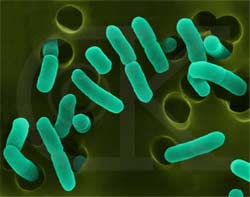For most people, the name "E. coli" is synonymous with food poisoning and product recalls, but a professor in Texas A&M University's chemical engineering department envisions the bacteria as a future source of energy, helping to power our cars, homes and more.
By genetically modifying the bacteria, Thomas Wood, a professor in the Artie McFerrin Department of Chemical Engineering, has "tweaked" a strain of E. coli so that it produces substantial amounts of hydrogen. Specifically, Wood's strain produces 140 times more hydrogen than is created in a naturally occurring process, according to an article in "Microbial Biotechnology," detailing his research.
Though Wood acknowledges that there is still much work to be done before his research translates into any kind of commercial application, his initial success could prove to be a significant stepping stone on the path to the hydrogen-based economy that many believe is in this country's future.
Renewable, clean and efficient, hydrogen is the key ingredient in fuel-cell technology, which has the potential to power everything from portable electronics to automobiles and even entire power plants. Today, most of the hydrogen produced globally is created by a process known as "cracking water" through which hydrogen is separated from the oxygen. But the process is expensive and requires vast amounts of energy -- one of the chief reasons why the technology has yet to catch on.
By selectively deleting six specific genes in E. coli's DNA, Wood has basically transformed the bacterium into a mini hydrogen-producing factory that's powered by sugar. Scientifically speaking, Wood has enhanced the bacteria's naturally occurring glucose-conversion process on a massive scale.
"These bacteria have 5,000 genes that enable them to survive environmental changes," Wood explained. "When we knock things out, the bacteria become less competitive. We haven't given them an ability to do something. They don't gain anything here; they lose. The bacteria that we're making are less competitive and less harmful because of what's been removed."

